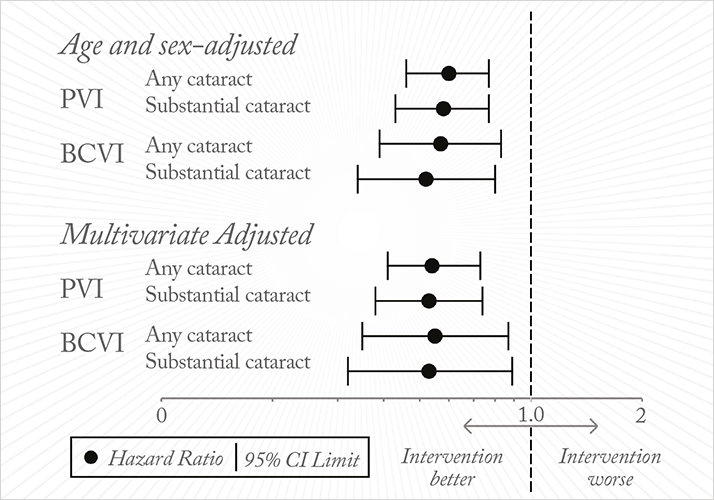
“Cataract surgery makes my patients’ lives better,” says Phillipe Crozafon, an ophthalmologist based in Nice, France. “They are depressed when they can’t even see the television. I know the difference that the surgery makes; I’ve seen it in my patients. They are reborn. I can confirm. I had my cataract removed, and my life was different – far better.”
Visual impairment has long been known to rob people of their quality of life, and condemn them to increased morbidity and a shorter life. Now, Calvin Sze-un Fong and colleagues at Sydney University’s Department of Ophthalmology have demonstrated the full impact of cataract surgery: significantly increased long-term survival (1). They studied 354 patents from the Blue Mountains region around Sydney who were aged 49 years or older and who had both cataract and visual impairment (or had undergone cataract surgery before baseline examinations). Presenting visual impairment (PVI) was defined as visual acuity less than 39 letters (less than 20/40) in the better eye, with or without the habitual use of distance glasses (if worn). Patients with AMD were excluded. Best-corrected VI (BCVI) was defined as the same level of visual acuity after subjective refraction. Mean follow-up of patients was 13.2 years at study completion.
The 15-year crude mortality rates of those who had and had not undergone cataract surgery were similar, but differences in many of the baseline demographic factors skewed these results. Adjustment for age and gender differences revealed that cataract surgery significantly improved survival. The additional correction of other baseline factors, including cardiovascular disease, in the multivariate analysis, showed that cataract surgery improved survival by approximately 60 percent – irrespective of whether mortality risks were assessed by PVI or BCVI measures (see Figure 1). Impaired vision may increase mortality among the elderly for a number of reasons, not least of which is the fact that most elderly patients receive a multitude of medications. Ensuring patient adherence to dosing regimens is challenging enough – especially with polypharmacy – but this becomes far harder with poor eyesight (2). This study shows that by removing cataracts, ophthalmologists not only increase a patient’s quality of life, but also extend their life.
References
- C. S. Fong, P. Mitchell, E. Rochtchina, et al., “Correction of Visual Impairment by Cataract Surgery and Improved Survival in Older Persons: The Blue Mountains Eye Study Cohort”, Ophthalmology, 120, 1720–7 (2013). A. J. Claxton, J. Cramer and C. Pierce, “A systematic review of the associations between dose regimens and medication compliance”, Clin Ther, 23, 1296–1310 (2001).
